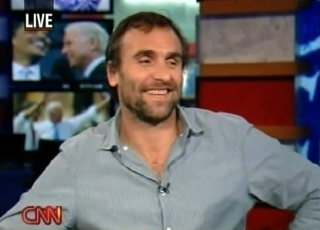AAM: "...you need a diplomatic answer, you've got to engage with Iran; but somehow, America has got to find a big stick."

Length: 4:05
LARGE (47.3 MB) ----- SMALL (5.0 MB)
Michael talks some more about the Biden plan, as well as the new timetable agreement and Iran's advantage in Iraq.
KIRAN CHETRY: There is a live look right now at Pepsi Center. And tonight it's 5:00 p.m. Eastern time, 3:00 p.m. Mountain time that that place is going to be rocking as the beginning of the Democratic National Convention kicks off with a laundry list of speakers. And they're going to be talking about Barack Obama and of course his VP choice, Joe Biden.
Well, if Joe Biden brings anything to the democratic ticket, certainly a wealth of experience especially in foreign affairs. And Barack Obama will need that if elected as he addresses some critical foreign policy questions.
CNN's Michael Ware knows the situation in Iraq and Afghanistan, all too well, maybe we should say.
MICHAEL WARE, CNN CORRESPONDENT: Yeah, sadly, yeah.
CHETRY: He's back from the conflict as well in Georgia. Michael joins us now. Thanks for being with us, by the way.
I'd like to get your insight about the talk about Iraq and what to do with Iraq. Now, Joe Biden, when he was running for president back in 2006, he talked a lot about his plan, which was partitioning Iraq into three separate and autonomous regions. Would that work?
WARE: No. It doesn't have a snowflake's chance, that kind of a solution. I mean, for a start, that just plays directly into Tehran's hands. I mean, one of the big issues that's being fought out now in Iraq politically is that the hard-core Iranian-backed Shia parties are trying to create a self-ruling zone in the south. That would basically become a Little Iran.
Now, in the north, you already have a self-governing state. The Kurds own Kurdistan, and they don't listen to the central government. They've got their own defense force. They've got their own foreign ministry. That's enough of a drama.
So to try and partition it off is just going to destabilize, not just the country but will further destabilize the region. And no one supports it. It ain't going anywhere.
CHETRY: Now, you know, the McCain campaign has actually hammered Barack Obama a lot for calling for this timetable. Now we have the Bush administration, Secretary of State Condoleezza Rice there last week hammering out what essentially is a timetable.
WARE: Yeah.
CHETRY: From the Bush administration. Has the thinking changed or is it almost a matter of sort of throwing the towel in trying to fight that issue?
WARE: Well, I think they're trying to dress it up. I mean, whether you want to call it failure, defeat, stalled -- whatever, the mission. Basically what they're doing is saying, well, look, the number of deaths are down. U.S. troops, you know, are faring much, much better. The sectarian violence is way, way down. So that all looks hunky-dory. So, okay, we're able to go, start winding back and call it a win. But that's smoke and mirrors.
Underlying all this of this is the fact that Iran has a much greater influence in that country and thereby increasing its influence in the region, anti-American influence, than they did before the American invasion. There's enormous implications for this kind of withdrawal. You can do it, but just accept what it's going to cost you. And then tell us, what are you going to do about it?
CHETRY: Well, you talk about that in the last hour as well, that there has to be some sort of acknowledgment about Iranian influence. Is that a diplomatic -- is that a window for a diplomatic solution or is that something that needs to have military might behind it and who might be better at trying to juggle that?
WARE: Well, there is no diplomacy without military might, at the end of the day. You know, very Clausewitzian: "War is just politics by another means." I mean, the problem is Iran has all the cards in its favor. I mean, there's very little stick with which to beat Tehran. And, for example, for the last -- since the end of last year, those American troops who have died in Iraq, most of them died at the hands of Iranian-backed militias, not al Qaeda, not the Sunni insurgency. And what's this all about? Not only is it to destabilize Iraq, not only is it to bog U.S. troops down; the bigger picture is they're looking for advantage to press on the nuclear issue. That's the big gain here for the Iranians. So, really, yes, you need a diplomatic answer, you've got to engage with Iran; but somehow, America has got to find a big stick.
CHETRY: All right. Michael Ware, thanks so much for being with us.
WARE: It's a great pleasure. Thank you, Kiran.
